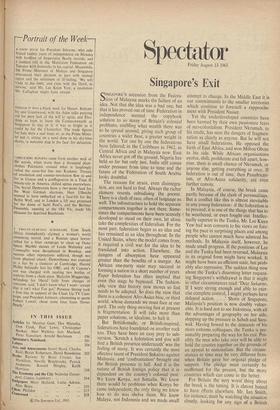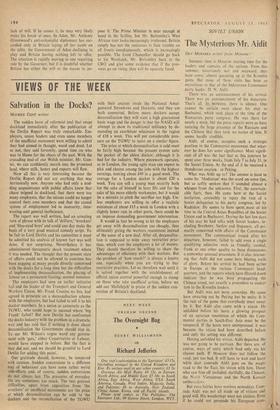Singapore's Exit
INGAPORE'S secession from the Federa- Ction of Malaysia marks the failure of an idea. Not that the idea was a bad one, but that it has proved out of time. Federation in independence seemed the copybook solution to so many of Britain's colonial problems, enabling what wealth there was to be spread around, giving each group of countries a wider base, a greater weight in the world. Yet one by one the federations have faltered; in the Caribbean in 1962, in Central Africa and in Malaysia now. East Africa never got off the ground, Nigeria has held so far but only just, India still comes under pressure from time to time and the future of the Federation of South Arabia looks doubtful.
The reasons for strain, even disintegra- tion, are not hard to find. Always the richer element resents subsidising the poorer. There is a clash of race, often of language as well. The infrastructure to hold the separate compartments together is not there. Some- times the compartments have been scarcely developed to stand on. their own, let alone take the complexities of federalism. For the most part, federation began as an idea and has remained as an idea throughout. In the United States, where the model comes from, it required a civil war for the idea to be translated into action. Elsewhere, the dangers of absorption have appeared greater than the benefits of a merger. An African one-party state may succeed in forming a nation in a short number of years. Paper federation has often implied that even this stage be bypassed. The fashion- able view that history now moves so fast needs to be adapted. So does the view that there is a coherent Afro-Asian bloc, or third world, whose demands we must face at our peril. The only thing moving fast at present is fragmentation. It will take more than paper solutions, or idealism, to halt it.
But British-made, or • British-inspired, federations have foundered on another rock too. They have been an easy prey to sub- version. 'Scratch a federation and you will find a British presence underneath' was the feeling of many. It was certainly the most effective taunt of President Sukarno against Malaysia, and 'confrontation' brought out the British presence in full. And it is the nature of British foreign policy that it is dependent on the country's colonial past: We knew Kenya, not Somalia. We knew there would be problems when Kenya be- came independent; the only thing we knew how to do was 'shelve them. We knew Malaya, not Indonesia and we made small attempt to change. In the Middle East it is our commitments to the smaller territories which continue to forestall a rapproche- ment with President Nasser.
Yet the underdeveloped countries have been harmed by their own passionate fears of neo-colonialism. President Nkrumah, to his credit, has seen the dangers of fragmen- tation as clearly as anyone. But he will not have small federations. He opposed the birth of East Africa, and won Milton (-Mote to his side. While African organisations evolve, shift, proliferate and fall apart, how- ever, there is small chance of Nkrumah, or anyone else, getting everything at once. If federation is out of time, then Panafrican- ism, or Afro-Asian solidarity, are even further remote.
In Malaysia, of course, the break came partly because of the clash of personalities.
But a conflict like this is almost inevitable in any young federation : if the federation is to proceed, it is one of the things that has to be weathered, or even fought out. Intellec- tually superior to the Tunku, Mr. Lee Kuan Yew had won converts to his views on forc- ing the pace in surprising places and among people who cannot much have admired his methods. In Malaysia itself, however; he made small progress. If the positions of Lee and the Tunku had been reversed, Malaysia in its original form might have worked. It might have been an efficient state, but prob- ably also repressive. The saddest thing now about the Tunku's disarming letter request- ing Singapore's withdrawal is that it might in other circumstances read: 'Dear Sukarno, If I were strong enough and able to exer- cise complete control, I might perhaps have delayed action. . . .' Shorn of Singapore, Malaysia's position is now doubly vulner- able. It is hard not to see Indonesia, with all the advantages of geography on her side, stepping up the pressure in Sabah and Sara- wak. Having bowed to the demands of his more extreme colleagues, the Tunku is pre- sumably preparing the way for his exit. Pos- sibly the men who take over will be able to hold the country together on the grounds of an appeal to nationalism. But the circum- stances in time may be very different from when Britain gave her original pledge of support, The pledge must certainly be reaffirmed for the present, but the more countries which can come in the better.
For Britain the very worst thing about the break is the timing. It is almost bound to have effects elsewhere. Mr. Ian Smith, for instance, must be watching the situation closely, looking for any sign of a British
lack of Will. If he senses it, he may very, likely make his break at once. In Aden, Mr. Anthony Greenwood's anti-colonialist diplomacy has suc- ceeded only in Britain laying all her cards on the table, the Government of Aden declining to play and Britain having nothing left to offer. The situation is rapidly moving to one requiring rule by the Governor, but it is doubtful whether Britain has either the will or the means to im-
pose it. The Prime Minister is near enough at hand in the Scillies, but Mr. Bottomley's West African tour looks increasingly irrelevant. Britain simply has not the resources to face trouble on all fronts simultaneously, which is increasingly possible. The Lord Chancellor should go back to his Woolsack, Mr. Bottomley back to the CRO and give some evidence that if the pres- sures go on rising, they will be squarely faced.































 Previous page
Previous page